Posted in Architecture, Trips at 12:00 on 2 May 2023
The ruins of Kildrummy Castle lie about 7 miles west of Alford in Aberdeenshire. On our trip there in August we tried to visit it on the first day but it was late by that time and the castle was closed. I was able to duck into the car park and take a photo though.
Kildrummy Castle from car park:-

We altered our plans slightly for the day we came home so as to try to see the castle properly.
Castle ruins fom the path up from the car park:-

<a href="
Judging by this illustration on the information board the castle would have been seriously impressive in its day:-

Model of castle in the shop:-

Interior of castle:-

To right of above:-

To left:-

The area the castle covered was extensive:-

Remains of towers:-
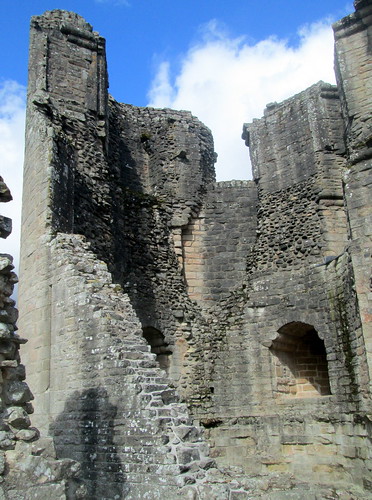

Cut-away illustration of the Snow Tower (most of which has long since collapsed):-

No Comments »
Posted in Architecture, Trips at 12:00 on 25 April 2023
Leith Hall is a country house near Kennethmont, Aberdeenshire. It was the home of the Leith-Hay family for nearly 300 years but is now run by the National Trust for Scotland. Since we were in the area last August we took the chance to visit it.
The Hall from the approach road:-


Back of house:-

At each side of the entrance gate to the Hall’s garden are Pictish Symbol Stones:-


Its gardens are nicely laid out.
Garden pathways:-



Feature wall:-

1 Comment »
Posted in Trips, History at 12:00 on 12 April 2023
Culsh Earth House is a souterrain near Tarland in Aberdeenshire.
It lies beside the road on the B 9119 and it would be easy to miss it. It’s just a passage leading underground and no-one now knows what its purpose was but it might have been for storage.

Entrance unlit:-

Lit with flash:-

End of (short) passageway:-

No Comments »
Posted in Architecture at 12:00 on 13 March 2023
Craigievar Castle is about six miles from Alford in Aberdeenshire. The castle is a fairly conventional turreted tower structure but is strikingly pink.
Craigievar Castle from car park:-

Castle from approach road:-

From east:-

Entrance:-
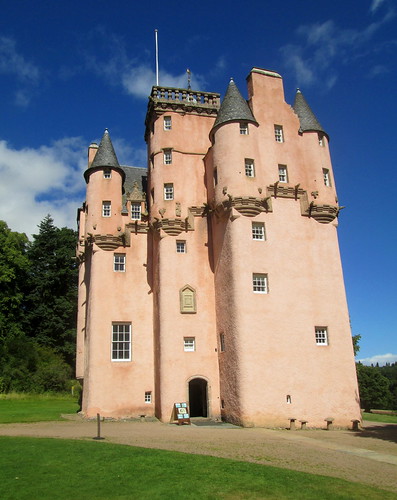
The castle has a barmkin:-

Barmkin with castle in background:-

Doorway in barmkin:-

Barmkin turret with door:-

No Comments »
Posted in War Memorials, Trips at 12:00 on 17 November 2022
Kemnay is a village in Aberdeenshire, Scotland. Its War Memorial is an obelisk rising from a stepped base at the junction of Station Road with the main B 993 road through the town.


Original Great War Dedication. “In Proud and Grateful Memory of the Sons and Daughters of Kemnay who Laid Down Their Lives for Freedom in The Great War”:-

Great War Names:-

Reverse of Memorial:-

The reverse is the aspect with the dedication “1939-1945 Kemnay Roll of Honour” and names for World War 2:-

1 Comment »
Posted in Architecture, Trips at 20:30 on 31 August 2020
On the way up to Peterhead we also stopped at Tolquhon Castle near Ellon in Aberdeenshire. The access road is quite narrow but still fine. The castle itself is fairly typical but has an impressive entranceway.

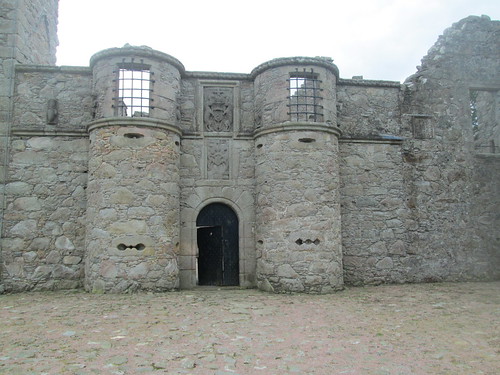

Castle Information Board showing how it looked back in the day:-

Castle courtyard:-

Information diagram:-
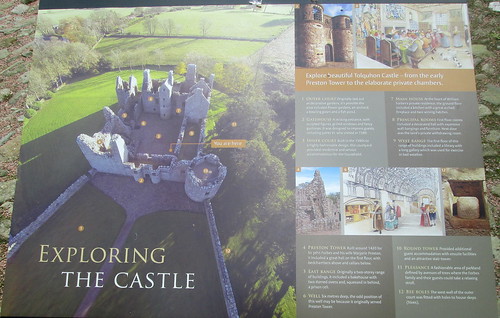
Entrance from above:-

Courtyard from above entrance:-

Fireplace:-
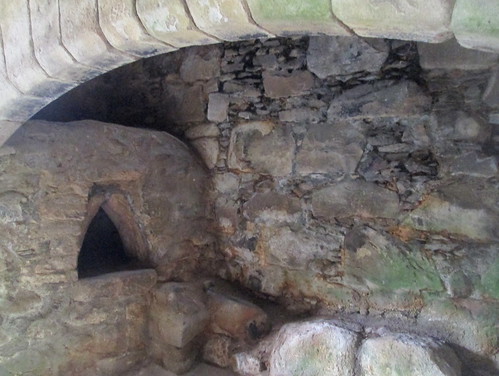
Part of interior (with another fireplace):-

Window and window seat:-

Courtyard from above looking back towards entrance:-

Steps up to solar:-

No Comments »
Posted in Trips, War Memorials at 20:00 on 3 March 2020
Fyvie is a village in Aberdeenshire, north-east Scotland..
Its War Memorial is a stone Celtic cross on a tapering plinth. The base of the column is marked, “In Remembrance.” The cartouche is inscribed, “Erected by parishioners of Fyvie to commemorate the bravery, devotion and sacrifice of the gallant men from this parish whose names and deeds will live for ever who gave up their lives for King and in the Great War 1914-1918.”

From East. Base of column marked, “The fellowship of his suffering.” Names below:-

From North. Base of column marked, “Precious shall their blood be in his sight.” Names below:-

From west. Base of column marked, “Death is swallowed up in victory.” Names below:-

No Comments »
Posted in Art Deco, Architecture at 12:00 on 3 March 2020
Turriff is a town in Aberdeenshire. We passed through it on our trip up north in October 2018 and stopped for a look around.
There were two buildings which had aspects of Art Deco.
Turriff Fish Shop/Bliss Gift & Flower Boutique. Horizontals, verticals, rule of three in windows. Decoration just below roof line:-

A much more borderline case. Grant Smith law practice. This may once have been a bank. It has that look:-

No Comments »
Posted in History, Trips at 12:00 on 29 February 2020
Huntly Castle in Aberdeenshire must have been really impressive in its day:-

The facade has embossed lettering announcing to the world who owned it. A statement of power and prestige:-

It reads, “George Gordoun First Marquis of Hvntlie 16” and on the line below, “Henriette Stevart Marquisse of Hvntlie 02.” It’s slightly easier to make out on the information board if you click on the picture to enlarge it:-
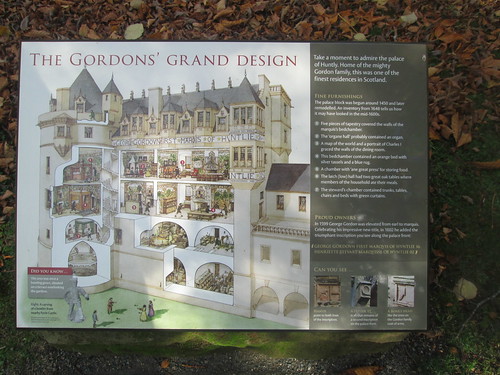
After paying the entrance fee you have to walk on the path past the frontage to get to the entrance:-

This is a reverse view from the grounds:-

And this a view from the side:-

The entrance tower is covered in carved armorial crests:-

The courtyard in front of it (behind it?) contains the ruins of some outbuildings:-


One of those was a brewery as I recall, with a stone built drainage channel:-

This mound of grass is all that remains of the original castle, a motte construction:-

That was the first of three castles on the site as this information board displays:-

No Comments »
Posted in History, Architecture at 12:00 on 20 February 2020
We had a trip up north in October 2018 and visited Drum Castle on the way. The castle was originally built in the 1200s.
Castle from car park:-

Rear of castle:-

From grounds:-


Facade and entrance:-

The external stairway (in photograph 3 above) leads to a door to these stairs. I believe it was the original entrance:-

Tower:-

Walk round battlements:-

Vertiginous view from battlement:-

Historic rose garden:-

The garden has a human sundial where if you stand in the correct place your body acts as a gnomon. The arc of stones indicates the times of day:-

The centre portion where you need to stand is marked variously March, April, May, June, July, August, September. I don’t know if the sun is too low in the sky – or too weak – in the winter months:-

No Comments »

















































































